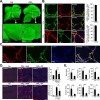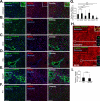Fate tracing reveals hepatic stellate cells as dominant contributors to liver fibrosis independent of its aetiology
- PMID: 24264436
- PMCID: PMC4059406
- DOI: 10.1038/ncomms3823
Fate tracing reveals hepatic stellate cells as dominant contributors to liver fibrosis independent of its aetiology
Abstract
Although organ fibrosis causes significant morbidity and mortality in chronic diseases, the lack of detailed knowledge about specific cellular contributors mediating fibrogenesis hampers the design of effective antifibrotic therapies. Different cellular sources, including tissue-resident and bone marrow-derived fibroblasts, pericytes and epithelial cells, have been suggested to give rise to myofibroblasts, but their relative contributions remain controversial, with profound differences between organs and different diseases. Here we employ a novel Cre-transgenic mouse that marks 99% of hepatic stellate cells (HSCs), a liver-specific pericyte population, to demonstrate that HSCs give rise to 82-96% of myofibroblasts in models of toxic, cholestatic and fatty liver disease. Moreover, we exclude that HSCs function as facultative epithelial progenitor cells in the injured liver. On the basis these findings, HSCs should be considered the primary cellular target for antifibrotic therapies across all types of liver disease.
Figures






Comment in
-
Liver: hepatic stellate cells hold the key to liver fibrosis.Nat Rev Gastroenterol Hepatol. 2014 Feb;11(2):74. doi: 10.1038/nrgastro.2013.244. Epub 2013 Dec 10. Nat Rev Gastroenterol Hepatol. 2014. PMID: 24322897 No abstract available.
-
Novel fate-tracing strategies show that hepatic stellate cells mediate fibrosis in vivo.Gastroenterology. 2014 Jun;146(7):1823-5. doi: 10.1053/j.gastro.2014.04.010. Epub 2014 Apr 21. Gastroenterology. 2014. PMID: 24768331 Free PMC article. No abstract available.
References
-
- Gabbiani G. The myofibroblast in wound healing and fibrocontractive diseases. J Pathol. 2003;200:500–503. - PubMed
Publication types
MeSH terms
Substances
Grants and funding
LinkOut - more resources
Full Text Sources
Other Literature Sources
Medical
Molecular Biology Databases
Research Materials

